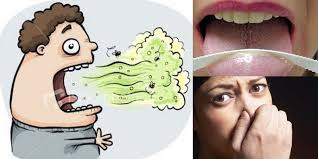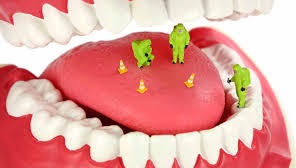WHAT CAUSES BAD BREATH?

Bad breath happens. If you’ve ever gotten that not-so-fresh feeling on a date, at a job interview or just talking with friends, you’re not alone. Studies show that 50 percent of adults have had bad breath, or halitosis, at some point in their lives. A cross-sectional Brazilian study among university students and their families, showed a malodour incidence of 15%.

There are a number of reasons you might have dragon breath. While many causes are harmless, bad breath can sometimes be a sign of something more serious. In nearly 85% of all halitosis cases, the origin is found in the oral cavity. A clinical evaluation of malodour on 2000 patients in Belgium, showed that 76% of these patients had oral causes: tongue coating (43%), gingivitis/periodontitis (11%) or a combination of the two (18%).
BACTERIA
Bad breath can happen anytime thanks to the hundreds of types of bad breath-causing bacteria that naturally lives in your mouth. Your mouth also acts like a natural hothouse that allows these bacteria to grow. When you eat, bacteria feed on the food left in your mouth and leaves a foul-smelling waste product behind.
DRY
Feeling parched? Your mouth might not be making enough saliva. Saliva is important because it works around the clock to wash out your mouth. If you don’t have enough, your mouth isn’t being cleaned as much as it should be. Dry mouth can be caused by certain medications (anticholinergics, antihistamines and diuretics dry the mucosa), salivary gland problems or by simply breathing through your mouth. Hyposialy can be caused by diabetes, Sjogren syndrome, stress, depression, medication, mouth breathing and alcohol abuse.
GUM
Bad breath that just won’t go away or a constant bad taste in your mouth can be a warning sign of advanced gum disease, which is caused by a sticky, cavity-causing bacteria called plaque.
FOOD
Garlic, onions, coffee… The list of breath-offending foods is long, and what you eat affects the air you exhale.
TABACCO SMOKING
Smoking stains your teeth, gives you bad breath and puts you at risk for a host of health problems. Tobacco reduces your ability to taste foods and irritates gum tissues. Tobacco users are more likely to suffer from gum disease. Since smoking also affects your sense of smell, smokers may not be aware of how their breath smells.
MEDICAL CONDITIONS
Mouth infections can cause bad breath. However, if your dentist has ruled out other causes and you brush and floss every day, your bad breath could be the result of another problem, such as Gastro-intestinal pathology, pulmonary pathology a sinus condition, gastric reflux, diabetes, liver or kidney disease. In this case, see your healthcare provider.
HOW CAN I KEEP BAD BREATH AWAY?
BRUSH AND FLOSS
Brush twice a day and clean between your teeth daily with floss to get rid of all that bacteria that’s causing your bad breath.
TAKE CARE OF YOUR TONGUE
Don’t forget about your tongue when you’re taking care of your teeth. If you stick out your tongue and look way back, you’ll see a white or brown coating. That’s where most of bad breath bacteria can be found. Use a toothbrush or a tongue scraper to clear them out.
MOUTHWASH
Over-the-counter mouthwashes can help kill bacteria or neutralize and temporarily mask bad breath. It’s only a temporary solution, however. The longer you wait to brush and floss away food in your mouth, the more likely your breath will offend.
DENTURES CLEAN
If you wear removable dentures, take them out at night, and clean them thoroughly before using them again the next morning.
KEEP THAT SALIVA FLOWING
To get more saliva moving in your mouth, try eating healthy foods that require a lot of chewing, like carrots or apples. You can also try chewing sugar-free gum or sucking on sugar-free candies. Your dentist may also recommend artificial saliva.
SMOKING OUIT
Giving up this dangerous habit is good for your body in many ways. Not only will you have better breath, you’ll have a better quality of life.
VISIT YOUR DENSTIST REGULARLY
If you’re concerned about what’s causing your bad breath, make an appointment to see your dentist. Regular checkups allow your dentist to detect any problems such as gum disease or dry mouth and stop them before they become more serious. If your dentist determines your mouth is healthy, you may be referred to your primary care doctor. Need a dentist?
WHAT CAN I DO TO PREVENT BAD BREATH?
Bad breath can be reduced or prevented if you:
1. Practice good oral hygiene. Brush twice a day with fluoride toothpaste to remove food debris and plaque. Brush teeth after you eat (keep a toothbrush at work or school to brush after lunch). Don't forget to brush the tongue, too. Replace your toothbrush every 2 to 3 months or after an illness. Use floss or an interdental cleaner to remove food particles and plaque between teeth once a day. Rinse with an antibacterial mouthwash twice a day. Dentures should be removed at night and cleaned thoroughly before being placed in your mouth the next morning.
2. See your dentist regularly -- at least twice a year. He or she will conduct an oral exam and professional teeth cleaning and will be able to detect and treat periodontal disease, dry mouth, or other problems that may be the cause of bad mouth odor.
3. Stop smoking and chewing tobacco-based products. Ask your dentist for tips on kicking the habit.
4. Drink lots of water. This will keep your mouth moist. Chewing gum (preferably sugarless) or sucking on candy (preferably sugarless) also stimulates the production of saliva, which helps wash away food particles and bacteria. Gums and mints containing xylitol are best.
5. Keep a log of the foods you eat. If you think they may be causing bad breath, bring the log to your dentist to review. Similarly, make a list of the medications you take. Some drugs may play a role in creating mouth odors.
WHO TREATS BAD BREATH?
In most cases, your dentist can treat the cause of bad breath. If your dentist determines that your mouth is healthy and the odor is not of oral origin, you may be referred to your family doctor or to a specialist to determine the odor source and treatment plan. If the odor is due to gum disease, for example, your dentist can either treat the disease or refer you to a periodontist, a dentist who specializes in treating gum conditions.
WHAT PRODUCTS CAN I USE TO ELIMINATE BAD BREATH?
An antiseptic mouthwash can help eliminate bacteria that cause bad breath. Ask your dentist about which product is best for you.